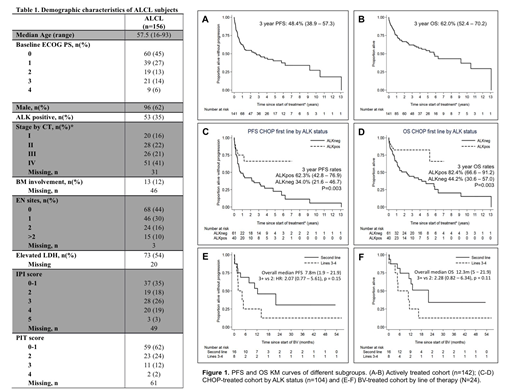Introduction
Anaplastic large-cell lymphoma (ALCL) is a rare subtype of T-cell non-Hodgkin lymphoma, characterized by uniformly strong CD30 expression and further delineated by expression of the Alk protein.
Standard first-line (1L) therapy is CHOP-based chemotherapy, with or without consolidative autologous stem cell transplant (ASCT) (Schmitz, Blood, 2010). Despite intensive chemotherapy approaches, 40-65% of patients experience relapsed/refractory disease, for which brentuximab vedotin (BV) as monotherapy has established efficacy (Pro, Blood, 2017)
Recent results from ECHELON-2 (E2), led to FDA approval of BV in combination with CHP (CHP+A) as first-line treatment for CD30+ PTCL, based on a 34% reduction in risk of death compared to CHOP, an effect only demonstrable in ALCL (70% of the E2 cohort) (Horwitz, Lancet, 2019). Given this renewed treatment landscape, we investigated outcomes of unselected patients with ALCL treated in routine clinical practice.
Methods/Study Population
Consecutively diagnosed patients with systemic ALCL from 6 UK and Australian centres (n=166) were studied (Dec 2004-Dec 2018). Patients ≥16 years with ALCL were included irrespective of Alk status. Treatment allocation was clinician choice and included best supportive care (BSC). Post-mortem diagnosis and 10 patients treated on E2 were excluded. Principal outcomes were PFS and OS following 1L treatment. Additional outcome measures included frequency of ASCT and use of BV for r/r ALCL. Data were retrospectively collected following GDPR guidelines and in accordance with the declaration of Helsinki.
Results
Median age at diagnosis was 57.5 years (range 16-93), 62% were male, 19% had ECOG ≥3 and 53 (35%) patients were ALK positive. Median lines of therapy was 1 (range 0-6). Baseline patient characteristics are shown in table 1.
The most frequent 1L treatment regimen was CHOP in 104 pts (67%), 26 (18%) received intensified regimens (CHOEP, CHOP/IVE/MTX, CODOX-M, ALCL99), 4 received other regimens (2.6%) and 14 had best supportive care (9%). Treatment-related mortality was 5.6% (8/142). 12 (8%) patients underwent ASCT in first response, of whom 10 had received intensified induction regimens.
Of 141 evaluable pts, ORR was 71% and CR rate was 52%. Median follow up of all patients was 40 months, 3-year PFS and OS for 1L of treatment were 46% and 58% respectively. For the CHOP-treated cohort (n=104), 3-year PFS and OS were 47% and 57%. Outcomes for ALK-negative patients treated with CHOP (n=78) were inferior to ALK-positive; 3-year PFS, OS of 35% and 44% vs 66% and 82% respectively (p=0.003 for both, figure 1).
BV was given to 24 pts (15%), mostly for second (16/24) line of therapy. Median doses received were 5 (range 1-14). ORR to BV was 11/24 (45%) and CR rate was 7/24 (30%). Median follow up after BV was 18 months, at which point the PFS and OS rates were 33% and 35% respectively (Figure 1). Bridging to ASCT or alloSCT occurred in 3 and 4 pts respectively, of whom 6 remain alive at data cutoff.
41 patients were staged with both CT and PET-CT, with concordant staging in 63%. 9/41 patients were upstaged by PET, 3 of which resulted in upgraded IPI score (extranodal sites not found on CT). 52 patients had PET-CT after first-line therapy. At data cutoff, 26/35 patients did not progress after PET-defined CR (74%), whereas 6/12 patients progressed after PET-defined PR (50%).
Conclusions
This study describes a large unselected cohort of ALCL treated in routine clinical practice prior to publication of the E2 study, observing a comparable baseline Alk pos/neg distribution. Notably, survival outcomes of our CHOP-treated cohort are similar to those in the E2 control arm, notwithstanding 28% of our patients with ECOG ≥3 (an E2 exclusion criterion) and also comparable to data from the prospective international T-cell lymphoma project (Shustov, Haematol Oncol, 2019). A minority of pts received intensified regimens and only 8% underwent ASCT consolidation. Achievement of CMR by PET-CT was still associated with a significant proportion of relapses. Outcomes of r/r ALCL treated with single-agent BV were inferior in our cohort as compared to the pivotal Phase 2 data (Pro, Blood, 2017). Our data represent an important benchmark as an unselected ALCL population treated with conventional chemotherapy in routine clinical practice; future studies of CHP+A in the real-world setting will be crucial in assessing the wider impact of the E2 study.
Martinez-Calle:ABBVIE: Other: Travel support. Manos:Janssen: Honoraria; Novo Nordisk Pharmaceuticals: Other: Travel. Bishton:Takeda: Other: Travel support, Research Funding; Janssen: Membership on an entity's Board of Directors or advisory committees; Celgene: Research Funding; AbbVie: Research Funding; Celltrion: Membership on an entity's Board of Directors or advisory committees, Other: travel support; Roche: Other: Travel support, Research Funding. Hawkes:Bristol-Myers Squibb: Research Funding, Speakers Bureau; Celgene: Membership on an entity's Board of Directors or advisory committees, Research Funding; Mundi pharma: Research Funding; Merck Sharp & Dohme: Membership on an entity's Board of Directors or advisory committees; Roche/Genentech: Membership on an entity's Board of Directors or advisory committees, Other: Travel expenses, Speakers Bureau; Roche: Research Funding; Astra Zeneca: Research Funding; Merck KgA: Research Funding; Janssen-Cilag: Membership on an entity's Board of Directors or advisory committees, Research Funding, Speakers Bureau; Gilead: Membership on an entity's Board of Directors or advisory committees, Research Funding; Takeda: Speakers Bureau. Osborne:Gilead: Consultancy; Pfizer: Honoraria, Speakers Bureau; Takeda: Consultancy, Honoraria, Other: Travel, Speakers Bureau; Novartis: Other: Travel; Servier: Consultancy; MSD: Consultancy; Roche: Consultancy, Honoraria, Other: Travel, Speakers Bureau. Collins:Gilead: Consultancy, Honoraria. Burton:Celgene: Membership on an entity's Board of Directors or advisory committees; Roche: Honoraria, Membership on an entity's Board of Directors or advisory committees, Other: Travel; Takeda: Honoraria, Membership on an entity's Board of Directors or advisory committees; Bristol-Myers Squibb: Honoraria, Membership on an entity's Board of Directors or advisory committees. Fox:AbbVie: Consultancy; Gilead: Consultancy; Janssen: Consultancy; Celgene: Consultancy; Sunesis: Consultancy; Takeda Pharmaceuticals: Consultancy; Atara Biotherapeutics: Consultancy; Adienne: Other: Travel Support.
Author notes
Asterisk with author names denotes non-ASH members.


This feature is available to Subscribers Only
Sign In or Create an Account Close Modal